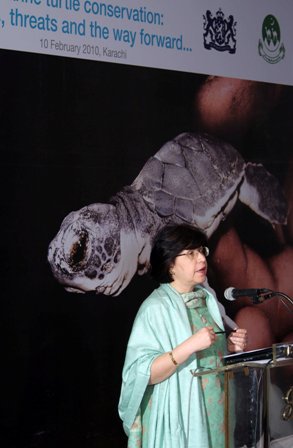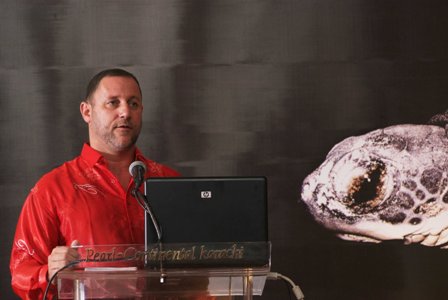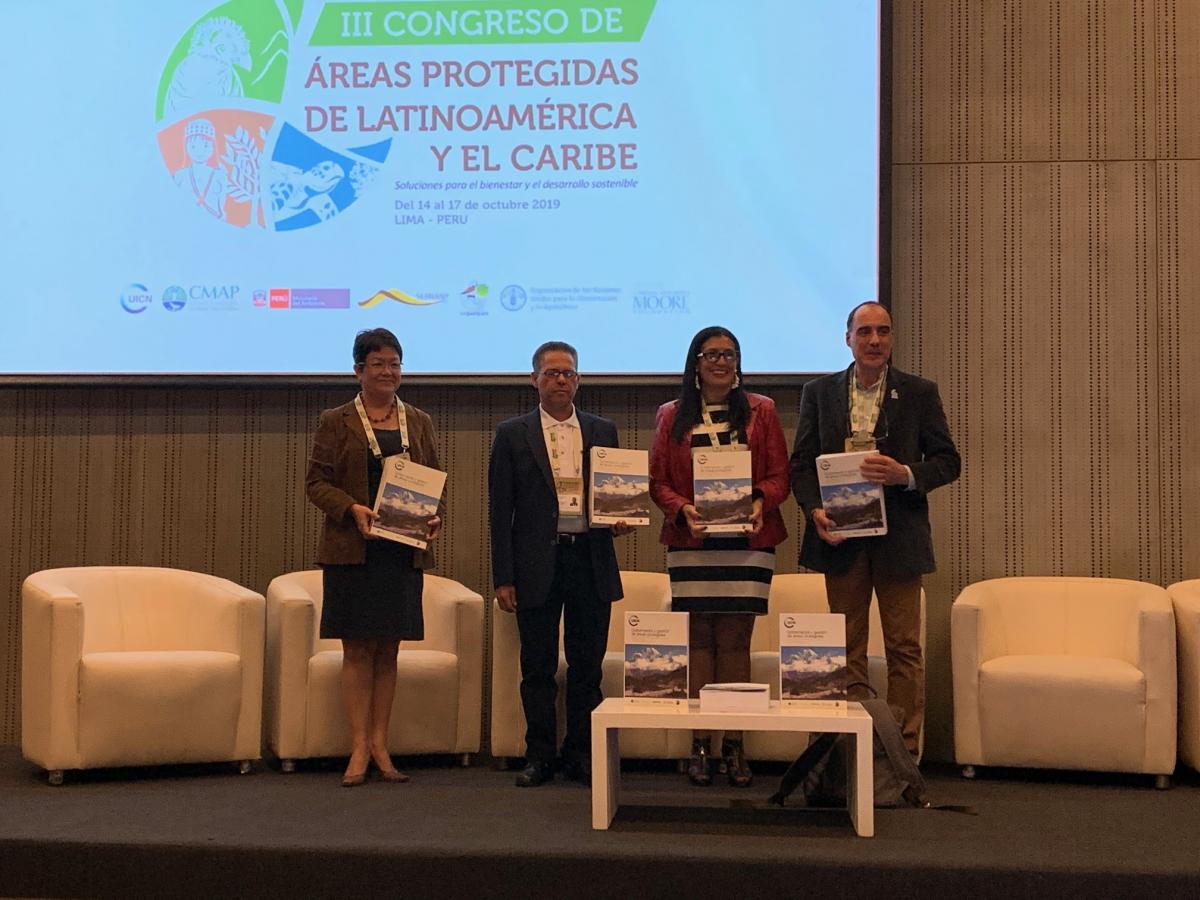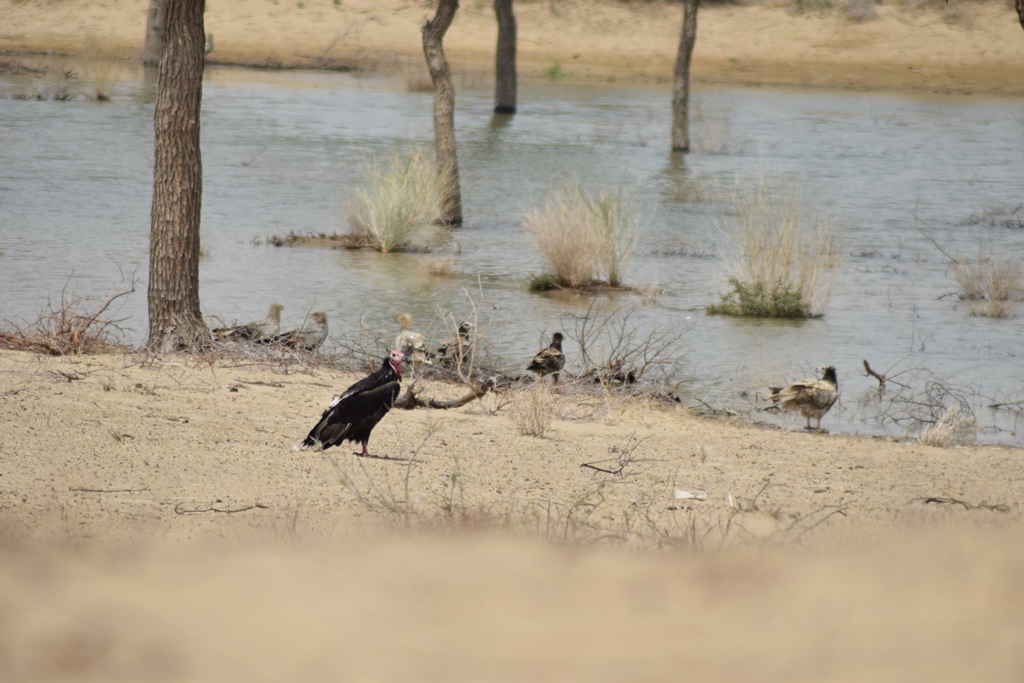IUCN holds Seminar on Marine Turtle Conservation, Experts discuss issues, threats and the way forward
KARACHI February 10: IUCN Pakistan’s Balochistan Programme arranged a seminar to highlight the state of the marine turtles in Pakistan.
Highlight of the seminar was the presentation by world renowned marine expert, Dr. Nicholas J. Pilchar, Founder and Executive Director, Marine Research Foundation, Sabah, Malaysia, Co-Chair, IUCN Species Survival Commission’s Marine Turtle Specialist Group.
The Manager of IUCN’s Balochistan Programme for Sustainable Development , Zabardast Khan Bangash welcomed the audience which was made up of marine and environmental experts from the government departments and NGOs.
He also informed the audience that IUCN was not just focusing on turtle conservation, but through its plan for Integrated Coastal Zone Management, was involved in many interventions, including mangrove rehabilitation and sand dune stabilization.
Aban Marker Kabraji, Regional Director IUCN Asia, one of the pioneers in the work of turtle conservation, along with Dr. Fehmida Firdous, Deputy Conservator at the Sindh Wildlife Department, Government of Sindh highlighted the importance of turtles in the ecosystem.
She said the turtle was an indicator species, and its presence or absence showed the health of the ecosystem. Their shifting migratory patterns and the fact that a species, Olive Ridley, has stopped coming to the beaches of Pakistan and nesting here are a call to attention. This is especially so in view of the changes being wrought by Climate Change. She also gave example of multi-stakeholder interventions, like the one in Orrissa in India where the construction of the Dhamra port was posing a threat to the habitat of the turtles, and how with the involvement of the corporate sector, like the Tata group, the issue was being addressed.
IUCN’s marine expert from Gwadar, Asghar Shah, gave a presentation about the threats to turtle population along the Balochistan, and the threats faced by it as many trawlers do not use the Turtle Excluder Devices, because of which many turtles die as bi-catch. Threats were compunded by the egg poachers who exported the eggs. He informed that amongst the nesting turtle that were found on Pakistan’s shores were the Green Turtle (Chelonia mydas) and the Olive ridleys (Lepidochelys olivacea), while the Hawksbill Turtle, Loggerhead Turtle and Leather back Turtle are the visiting turtles.
Some of the natural threats they face include Beach Erosion, Climate Change (change in sea temperatures etc,), Feeding Habitat Destruction, Disease, Threats from Dogs, Foxes and Cats, Sea Gulls and Ghost Crab. Threats from human actions include Sand Mining for Construction, Beach armours (protection wall), Beach lighting, Poaching of Turtle Eggs, utilization of eggs for livestock and human consumption, medicinal use (to treat Asthma, blood of Turtles used to treat paralysis patients), Gill Nets and Long line, Trawling, Ghost Nets, Plastic Bags, Picnickers, and Oil Pollution.
Ahmad Khan of the Pakistan Wetlands Programme presented finding of the turtles visiting the shores of Pakistan and stressed on the need for monitoring their migration patterns. He explained how they had already collected data through tagging the turtles and monitoring them through satellite tagging.
Dr. Fehmida, popularly known as the “turtle lady’ for her extensive work in the conservation of the species in Pakistan spoke of the various threats to the turtles. She called for the enforcement of existing regulations regarding the use of Turtle Excluder Devices by the fishing trawlers, and setting up of turtle reserves. She also stressed on the importance of genetic identification of the species, and concerted efforts at raising awareness. She proposed the setting of a Turtles Conservators’ Forum in Pakistan. Other important points touched upon by her were the monitoring of priority marine turtle areas, adopting standardization of protocols, and capacity building of conservators. She also said the issue should be viewed in a transboundary context.
Before his presentation, Dr. Nicholas J. Pilchar commended the turtle conservation work being done in Pakistan by the various departments and agencies. He called upon the reliance on science and use of data collected over a longer period to arrive at correct assessments about the population trends of the turtles. With examples drawn from his studies across the globe, he illustrated the trends and said the situation was quite positive.
For Pakistan, he seconded the idea of forming a forum of turtle conservators, and offered his assistance. Being a member of the Marine Turtle Specialist Group in the Species Survival Commission of IUCN, he said he had the advantage of the knowledge base of over 200 scientists, whose experience he could bring to the table.
He urged for the scientific study of the data available on turtles, and its implementation for their conservation, through community involvement.
Shah Murad Aliani, Country Representative of IUCN Pakistan closed the proceedings with a note of thanks for the participants, especially Dr. Pilcher, and assured everyone of IUCN’s continued support in the efforts to take the issue of turtle conservation forward.
For details please contact:
Afia Salam
Coordinator, Education, Communications and Outreach
0300 9223019
1 Bath Island Road
Karachi 75530
afia.salam@iucn.org
www.iucnp.org
About IUCN
IUCN, the International Union for Conservation of Nature, helps the world find pragmatic solutions to our most pressing environment and development challenges by supporting scientific research; managing field projects all over the world; and bringing governments, NGOs, the UN, international conventions and companies together to develop policy, laws and best practice.
The world's oldest and largest global environmental network, IUCN is a democratic membership union with more than 1,000 government and NGO member organizations, and almost 11,000 volunteer scientists and experts in some 160 countries. IUCN's work is supported by over 1,000 professional staff in 60 offices and hundreds of partners in public, NGO and private sectors around the world. IUCN's headquarters are located in Gland, near Geneva, in Switzerland.






